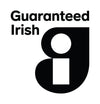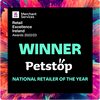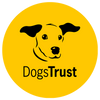
Bringing home a loveable new puppy is one of life's joys and we have a great guide to help you make it stress free and smooth. Before your puppy arrives you need to puppy proof your home! Just like any toddler there are certain things you need to put out of reach and make safe.
How do I prepare my home for my Puppy?
- Keep all trailing electrical cables out of reach of little teeth.
- Breakable ornaments should be moved well out of the way from wagging tails.
- Move all house plants up a level as some of them can be poisonous if eaten.
- Put shoes, slippers and clothing away in wardrobes and cupboards so they are not chewed and swallowed.
- Keep the kitchen clear of hazards – don't let your puppy have access to bin bags or plastic shopping bags.
- Place a guard round an open fire.
- Close toilet lids so your puppy won't fall in or learn to drink from the bowl!
- Make sure your garden is securely well fenced and free of poisonous plants!
Puppy check list
You'll find a handy shopping list below of everything you need to consider buying for your new puppy, and of course, all of it is available at Petstop!
- Puppy Bed, Basket or Crate
- Puppy Food and Treats
- Puppy Food & Water bowls
- Puppy Lead, Harness & ID tags
- Puppy Grooming Brushes
- Puppy Toys
- Puppy Flea & Worming Treatment
 Settling in your Puppy to their new home
Settling in your Puppy to their new home
Your puppy will want a warm, quiet cosy corner to settle into. It's a big change for him when he leaves his Mum and he will want to feel safe and secure. Your puppy's bed or basket should be nice and comfortable and in a quiet, draught free spot. Place it in the corner of a room where he can see the family and doesn't feel isolated.
A washable bed is best in case of accidents. If you have other pets that you want to introduce to your puppy safely or rooms that you don't want your puppy to get into, a dog safety gate is a good idea. They are similar to the stair gates that we use for our toddlers.
Puppy Crates can be used instead of a bed or a basket and have some advantages. If you need to pop out and have to leave your puppy for an hour or so you can put him in his crate and he will not be able to get up to any mischief. If you are leaving your puppy unsupervised in a crate be sure to remove his collar.
Crates can also be used to house train your puppy and provide a snug, private den of his own. When buying a crate make sure it is big enough for your puppy – he should be able to stand and sit without his head touching the top, be able to turn around, and be able to lie down without being cramped for room.
View our Products section for our range of crates, beds, pens, gates and kennels.
What Sort Of Food And Water Bowls?
Food and water bowls should be puppy sized! If his bowls are too big he could end up paddling in them on knocking them over. Remember puppies chew everything, so robust ceramic or steel bowls are best.
Visit our Products section for suitable puppy food and water bowls
What sort of puppy collars and leads?
Make sure his collar, harness or lead are the right size for him and have an ID tag on his collar. Better still why not have your puppy micro-chipped?
Visit our Products section for suitable puppy collars and leads
Should I Grooming my puppy ?
Yes, get your puppy used to being groomed – it's good for him and his coat but it's also a special time you can spend together building trust and bonding.
To learn more about grooming your puppy visit our Dog Grooming Advice. View our grooming accessories in our Products section. If you would like to make an appointment with our Professional Dog Groomer.
Puppy Toys
Don't forget to buy some toys for your puppy – there are specially designed toys available to help him when he is teething. He may seek out a special toy to cuddle if he is missing his Mum so give him a selection to play with. You shouldn't play rough games with your puppy till his adult teeth are properly developed or you could hurt him.
Visit our Dog Playtime Advice for some good tips on playing with your puppy.
View our Dog Products section for our range of safe puppy toys.
Your Puppy’s Health
Healthy puppies are happy puppies so once your puppy is settled in at home you should register with a vet to have a puppy health check.
- You should have your puppy vaccinated when he is around 8 weeks old and the second booster vaccination is due when he is 12 weeks old.
- You should keep your puppy away from other dogs and avoid places where other dogs might have been until your puppy has had all his vaccinations.
- View our Dog Health and Vaccinations Advice to learn more
- You will need to worm your puppy as most puppies are born with roundworms. There are several treatments available to protect your pet from worms and fleas but always make sure they are suitable for puppies as adult ones are too strong.
- Your puppy's sharp little baby teeth will start to fall out as he develops his adult set around the age of 3 -12 months. He may have toothache and sore gums and you can help him over this time by giving him safe chewable toys that are suitable for freezing. These can numb his mouth and ease his pain. There are also hard rubber toys, rawhide chews and bones and puppy teething gels available. It's important to look after your puppy's teeth so brush them regularly with doggy toothpaste – and don't forget to hide your slippers!
- Puppies need puppy food so you shouldn't feed them adult dog foods as they will get tummy upsets (unless it is a high grade food designed for puppy and adult dogs). Try not to feed your puppy before or straight after exercise as this can also lead to problems. Your puppy should always have clean fresh water available in a bowl and you can also treat him to puppy milk. Puppies have little stomachs but big appetites so feed them little and often. How much you feed depends on their age, size, breed and general health.
- Certain manufacturers make puppy foods for specific breeds but if you are not sure how much or how often to feed your breed of puppy, ask ourselves or your vet for advice.
- Walk your puppy on a lead along quiet pavements and build up to taking him out to busier areas to get him used to traffic and pedestrians. Teach him not to pull and to keep to heel by using a harness which is kinder than a collar. Never ever use a choke chain as they are dangerous.
- Playing with balls and frisbees can teach him to stay and to fetch. Don't throw sticks as they can splinter in his mouth and injure him and don't throw stones as they can damage his teeth.
- Your puppy needs to learn that it's wrong to bite people. Puppies like to mouth things, especially during teething, but you must teach him that he mustn’t mouth people.
- You can begin toilet training as soon as you have brought your puppy home. He will need to go outside to relieve himself every two hours at first. Take him outside first thing in the morning; after he has had something to drink or eat, if he is excited after playing and before you go to bed. You can usually tell when he needs to go as he will look anxious, walk around in circles and start looking for a suitable place. When he goes in the right place outside give him lots of praise and affection.
- If your puppy does have an accident indoors don't rub his nose in it, shout or get angry as this will make him frightened and could stop him from trying to tell you that he needs to go. Always clean the floor thoroughly to remove the odour from the spot or else your puppy will use the spot again and again.






